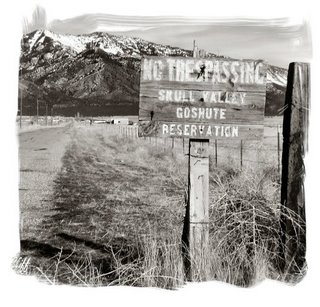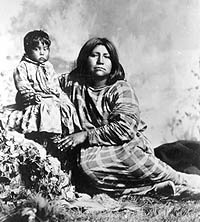
Here's an interesting
interview of historian Dennis Defa, who has had a life long fascination with Skull Valley and its Goshute Indians. From what I can see, there aren't many living in the valley today. The
Goshutes, a very small community of the Shoshone tribe, had long ago adjusted themselves to living in Death Valley and later Utah's Skull Valley. Mr. Defa observes about these 100 or so Native Americans:
"The [Skull Valley] Goshute represent, I think, the best example of what's been called the desert culture in modern terms than any of the other groups in the Great Basin. There were never many of them, but there have always been people out there. And for white Americans or the casual observer, it's a desert. It's a harsh desert. It's not even a pleasant desert like the deserts in Arizona, the Sonora Deserts. But yet the Goshutes have always viewed it as their home. They have an intimate understanding of everything that desert provides."
 "...Water is the common denominator out there. Without water you don't survive. With water you can survive fairly well. As whites moved into the West Desert, they had to have the same thing. They had to have water. They had to have grass for their livestock. And as they moved into those more favorable areas, Indians were forced out. By depriving them of the water and the resources that went along with the water, the Indians suffered horrifically. They lost food sources. They lost places of shelter. They lost access to pinion pines for pine nuts and they came in direct competition with the white settlers. Horses didn't mean anything to the Goshute, these are not buffalo hunting Indians. Horses were direct competition. They ate the grass that provided the seeds for the Goshute. When the Pony Express and the Overland Stage went through, water is the common denominator. And when you're using animals like horses, you have to have water and you have to have feed. Those were the same places that the Goshute used to gather."
"...Water is the common denominator out there. Without water you don't survive. With water you can survive fairly well. As whites moved into the West Desert, they had to have the same thing. They had to have water. They had to have grass for their livestock. And as they moved into those more favorable areas, Indians were forced out. By depriving them of the water and the resources that went along with the water, the Indians suffered horrifically. They lost food sources. They lost places of shelter. They lost access to pinion pines for pine nuts and they came in direct competition with the white settlers. Horses didn't mean anything to the Goshute, these are not buffalo hunting Indians. Horses were direct competition. They ate the grass that provided the seeds for the Goshute. When the Pony Express and the Overland Stage went through, water is the common denominator. And when you're using animals like horses, you have to have water and you have to have feed. Those were the same places that the Goshute used to gather."
 Here's an interesting interview of historian Dennis Defa, who has had a life long fascination with Skull Valley and its Goshute Indians. From what I can see, there aren't many living in the valley today. The Goshutes, a very small community of the Shoshone tribe, had long ago adjusted themselves to living in Death Valley and later Utah's Skull Valley. Mr. Defa observes about these 100 or so Native Americans:
Here's an interesting interview of historian Dennis Defa, who has had a life long fascination with Skull Valley and its Goshute Indians. From what I can see, there aren't many living in the valley today. The Goshutes, a very small community of the Shoshone tribe, had long ago adjusted themselves to living in Death Valley and later Utah's Skull Valley. Mr. Defa observes about these 100 or so Native Americans:"...Water is the common denominator out there. Without water you don't survive. With water you can survive fairly well. As whites moved into the West Desert, they had to have the same thing. They had to have water. They had to have grass for their livestock. And as they moved into those more favorable areas, Indians were forced out. By depriving them of the water and the resources that went along with the water, the Indians suffered horrifically. They lost food sources. They lost places of shelter. They lost access to pinion pines for pine nuts and they came in direct competition with the white settlers. Horses didn't mean anything to the Goshute, these are not buffalo hunting Indians. Horses were direct competition. They ate the grass that provided the seeds for the Goshute. When the Pony Express and the Overland Stage went through, water is the common denominator. And when you're using animals like horses, you have to have water and you have to have feed. Those were the same places that the Goshute used to gather."

No comments:
Post a Comment